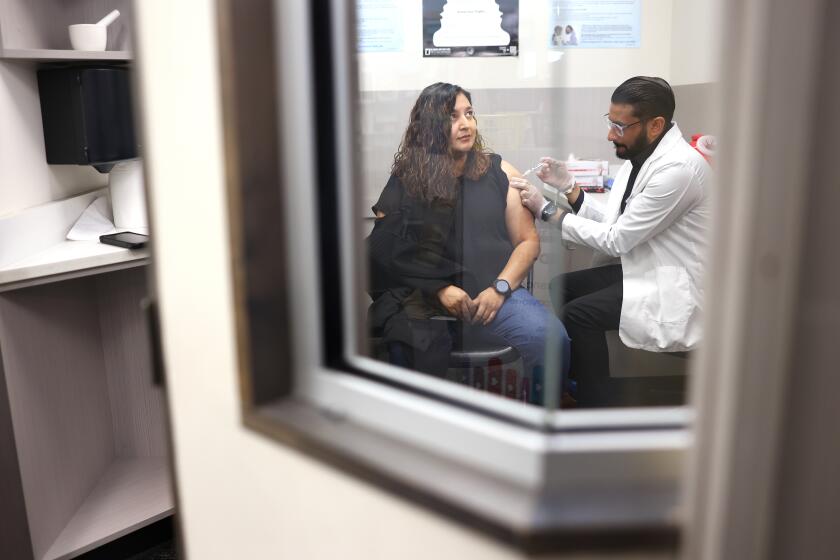NEWS ANALYSIS : AIDS Conference Loses Its Sense of Urgency : Health: The effort to find a cure has been bogged down by politics and economics. Scientific progress has slowed since the initial flurry of activity.
As the annual International Conference on AIDS ended here last week, there was little doubt that it marked a new era of uncertainty about the pace of future progress against the disease, and about the meeting itself.
Few would deny that the conference remains the single most important forum for the exchange of new scientific information on AIDS. People throughout the world anxiously look to the meeting for signs of hope against one of the planet’s most dreaded ailments.
But as more progress has been made against the disease, the frenzy of research has slowed. A key reason is that AIDS has also moved into the mainstream of medical science.
“Many people who have been at this (meeting) from the start feel like it is the end of an era,” said Andrew Moss, an epidemiologist who conducted pioneering studies of AIDS in San Francisco. “You don’t get an adrenaline rush anymore. There is much more normal science. The conference is like a typical medical meeting with a moderately high level of scientific quality.”
“In Florence, the sense of urgency that was common to all the previous conferences seems to have faded,” Oliver Morton, science editor of the Economist, wrote in a commentary for a special newspaper distributed to conference participants. “It is not gone. . . . But it is not the progressive force it once was.”
The annual meeting is a victim not only of the loss of a sense of urgency but of politics and economics as well.
Earlier this month, Nature, the prestigious British scientific journal, called the gathering a “dispensable carnival” that has become unmanageable and unproductive. The journal said the meeting “has outlived its usefulness and should be stopped.”
Many of the 8,000 delegates at last week’s AIDS conference felt this critique was overstated, but it is clear that the gathering faces an uncertain future.
The 1992 International AIDS Conference is scheduled for Boston. But organizers said Friday that it is likely to be canceled because of American travel and immigration restrictions against people infected with the human immunodeficiency virus, the cause of AIDS.
The next scheduled AIDS conferences, in Berlin in 1993 and Japan in 1994, are expected to take place. After 1994, the conference is to be held only every other year.
“The pace of increased information has begun to slow,” said Dr. Paul Volberding of San Francisco General Hospital and president of the International AIDS Society, which schedules the meetings. The search for an AIDS vaccine and cure is proving far more daunting than the discovery of the virus and the development of an accurate HIV blood test.
In announcing the change to every-other-year conferences last week, Volberding also cited the expense of staging the gatherings--which cost about $10 million each--and the difficulties of organizing them.
The character and size of these future meetings may be far different than the seven International AIDS Conferences held to date.
One commonly held scenario, advocated by the editors of Nature and others, is that the meeting should gradually be replaced by smaller conferences in specific areas of AIDS research, such as basic science, vaccine development or AIDS prevention programs, where the likelihood of meaningful exchange of information is greater. Some, but certainly not all, AIDS researchers already save their best data for smaller conferences or for publication in medical journals.
Another scenario is that the American presence at future AIDS conferences held overseas will markedly diminish. This year, congressional leaders threatened to cut federal funding for AIDS research unless the Department of Health and Human Services substantially reduced the number of scientists it was planning to send to the meeting.
As a result, days before the meeting the planned delegation of 400 federal scientists was reduced to about 200. Little of the $1.5 million budgeted for the trips was actually saved, because of non-refundable travel arrangements.
The United States spends more money on AIDS research and the care of AIDS patients than any other nation. In Florence, Americans represented almost one-third of the 8,000 delegates and presented about 1,160 of the 3,500 scientific papers. France was a distant second, with about 650 delegates and 313 scientific papers.
The controversy over sending federal scientists to Florence disturbs many leading American AIDS researchers.
Several voiced private concerns that the situation will embitter young scientists who work hard at low wages but receive little recognition. In addition, they said the controversy may set back the international scientific cooperation against AIDS achieved over the last decade.
“There is a real loss of morale,” said one senior federal AIDS researcher, who requested anonymity. Another uncertainty is the role that American AIDS activists will play at future AIDS conferences.
Groups like ACT UP and the Gay Men’s Health Crisis have become very powerful. In Florence, activist groups conducted numerous demonstrations. Most of these protests, however, were far smaller and less disruptive than protests at the 1990 AIDS meeting in San Francisco.
But ACT UP members also threatened to give the Harvard organizers of the 1992 Boston AIDS conference “a tea party they’ll never forget” if the meeting is held while any American travel and immigration restrictions against HIV-infected people remain in effect.
As a result, Max Essex, the chairman of the Boston meeting, agreed Friday to cancel it unless the Bush Administration lifts these restrictions by Aug. 3. Days before, Essex had said the meeting might be canceled if intensive efforts to change government policy fail but that a final decision would not be made for several months.
At the closing ceremony in Florence, Essex expressed outrage at “discriminatory U.S. policies.” But he also deplored the “ultimatums” he said he had received and the loss of “mutual respect and coordination” among scientists, people with HIV infection, health care professionals and activists.
Essex, a well-known virologist, also expressed his belief that the activists with the loudest voices represented only a small percentage of the estimated 10 million HIV-infected individuals throughout the world.
“The Third World . . . is experiencing 95% of all new HIV infections,” Essex said. “These people will most certainly die with no voice at all. We must not be so preoccupied with our own domestic policy problems that we close our minds to their pain and suffering.”
People from developing nations look at American AIDS activists “with curiosity,” said one American physician who works overseas. “It is absolutely strange (to them). . . . Their political agendas are less relevant.” In the end, many researchers feel that the AIDS conference, while important, is less significant than efforts to end HIV-related discrimination throughout the world and the continual open exchange of scientific information about AIDS.
“The United States is at least in some senses looked up to as a model,” said Volberding, the president of the International AIDS Society. “If we prove to be a model for discrimination and of politics over science, then that could well be a model that other countries follow.”



